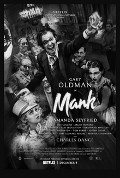
Directed by
David Fincher
131 minutes
Rated M
Reviewed by
Bernard Hemingway

Mank
As its bluntly unrevealing title signals, David Fincher’s Mank is a film for the in-crowd, the “in” being American cultural history generally, American film and theatre history particularly and specifically, Orson Welles’ towering 1941 masterpiece, Citizen Kane.
“Mank” was the sobriquet of Herman Jacob Mankiewicz essayist, playwright, theatre critic, and screenwriter who, according to Fincher’s film rose to the top of his game with his script for Citizen Kane only to see the 24 year old wunderkind that was Welles muscle in on his act and claim fifty percent of the credit (the weight of opinion, however, seems to be in Welles’s favour). What anyone would make of Fincher’s film without knowing this and/or having seen Kane I can’t say but I suspect not much as not only is it grounded in the history of that film’s making but timewise it jumps around gymnastically in the past from the film’s present which, rather ironically, has Mank immobilized after a car accident which left him with a broken leg.
I don’t know if there is any extant video or audio of Mankiewicz but with a passing resemblance to photographs of him Gary Oldman does, for me at least, an effective job in the title role although as Mankiewicz was born in New York I’m not so sure about his German accent. Either way the role doesn’t demand a lot from Oldman whose Mank spends his time running boozed-soaked bon mots and disgracing himself in public.
Whilst this is partly the result of the clever but brittle script by Jack Fincher, father of the director, which has Mank tossing off withering witticisms at a rate that would put Oscar Wilde to shame it is also a function of Fincher fils’ well known perfectionism. It’s not easy to create dramatic dynamism on screen when you’re doing a hundred takes of a scene, something which the director was apparently quite capable of doing.
In this respect Mank is less a biopic about the writer as a man than a window on this highwater period in American letters and arts with Fincher and his team giving us, visually and aurally, a kind of modern day correlate of Welles’s bravura film (Mank deservedly won Oscars for production design and cinematography. Oldman was nominated for Best Actor but lost to Anthony Hopkins for The Father)
With a running time of 130 minutes, Fincher’s film could have been reshaped to spend less time ticking off familiar names, in many ways this an easy way out (compare, for instance, Woody Allen’s Midnight In Paris, 2011) instead of coming to grips with Mankiewicz’s prickly character and what lay at the roots of his creativity, his compulsive gambling and alcoholism (tragically, he drank himself to death by the age of fifty-five) particularly as his brother, Joe (Tom Pelphrey), who would go on to direct the classic All About Eve (1950) was one of his Tinseltown colleagues and pops up handily throughout the film.
Having said that, Mank is super-stylish and dryly witty and that, for my money, is not a bad way to pass your time.
Want something different?





